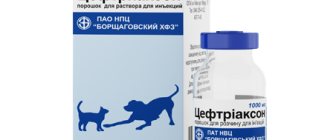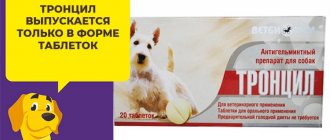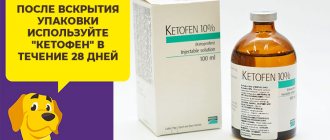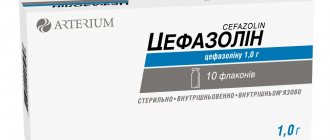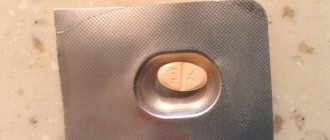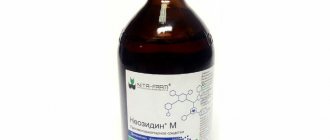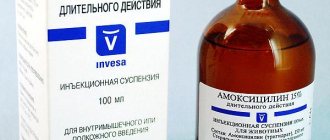Rimadyl for dogs is an excellent painkiller that causes both a lot of positive and negative responses, which, however, is quite typical for anti-inflammatory non-steroidal drugs.
But, nevertheless, if you put the results of treatment and the harm that it can cause on the scales, then the advantage will be in the direction of benefit. You just need to use Rimadyl strictly following the recommendations and prescriptions of your veterinarian.
Side effects
Reviews about Rimadyl are mixed. On the one hand, this is an effective medicine, on the other hand, it is dangerous if you do not follow the rules of administration. According to the manufacturer's instructions, the medication is completely safe. However, in practice it is clear that undesirable reactions may occur in the body. This usually happens due to the inexperience of the breeders themselves, who are negligent in handling such a serious drug.
If the dosage is violated, the following effects may occur:
- allergic rashes, redness;
- slowness of movement or excessive activity;
- aggression, anxiety, poor sleep;
- yellow color of the whites of the eyes, mucous membranes, skin;
- the appearance of ulcers on the skin;
- vomit;
- frequent urination;
- loss of appetite or excessive consumption of food and water;
- diarrhea, blood in stool or black stool;
- convulsions, dizziness, paralysis.
The most severe reactions include stomach and intestinal bleeding, as well as deep skin ulcers. Even with minor side effects, the drug should be discontinued. Contact your veterinarian and tell him that this happened due to the use of a painkiller. Just in case, take the package of the drug along with the description. Usually the doctor prescribes antihistamines or other symptomatic medications.
pharmachologic effect
Pharmacotherapeutic group: non-steroidal anti-inflammatory drug. Carprofen, the active ingredient of the drug Rimadyl 5% solution for injection, belongs to the group of non-steroidal anti-inflammatory drugs and has anti-inflammatory, analgesic and antipyretic effects. Carprofen, like other non-steroidal anti-inflammatory drugs, inhibits cycloxygenase in the arachidonic acid cycle. In this case, carprofen predominantly affects cyclooxygenase-II, under the influence of which the synthesis of inflammatory prostaglandins (PGE1 and PGE2) occurs, causing inflammation, swelling and pain. In therapeutic doses, carprofen has a much weaker effect on cyclooxygenase-I, and therefore does not affect the synthesis of protective prostaglandins. Thus, carprofen does not interfere with normal physiological processes in tissues, especially in the stomach, intestines, kidneys and platelets. Carprofen is rapidly absorbed from the injection site. The half-life in dogs is about 8 hours, in cats it is about 19 hours. Carprofen is more than 99% bound to plasma proteins, metabolized in the liver, and is excreted mainly in feces (about 80%) and to a lesser extent in urine. Rimadyl 5% injection solution in terms of the degree of impact on the body is classified as a moderately hazardous substance (hazard class 3 according to GOST 12.1.007).
Purpose
Rimadyl is prescribed to prevent or block inflammation:
- with exacerbation of chronic diseases of the locomotor (musculoskeletal) system;
- with bursitis;
- osteoarthritis;
- injuries (fractures, dislocations, sprains, severe bruises);
- during the rehabilitation period after surgery on the musculoskeletal system.
The main purpose of using the medicine is to stop inflammation and relieve pain, so Rimadyl in the form of injections is prescribed as an analgesic, and for chronic diseases in the acute stage - to relieve symptoms. As a rule, the drug is prescribed as part of complex therapy aimed at eliminating the cause of the disease.
Joint diseases in dogs are often associated with increased activity. Among the diseases of the musculoskeletal system that cause many problems for animals and their owners:
| Arthrosis | It occurs as a result of “wear and tear” of the joints and subsequent destruction. It can be difficult to diagnose pathology at an early stage, which leads to an advanced form in which loss of limb function is possible. |
| Arthritis | Characterized by structural changes and inflammation of cartilage tissue. The animal is in severe pain and has difficulty moving. |
| Osteochondrosis | The disease is a violation of the mineral composition of cartilage tissue. The disease can be detected already in puppyhood, when the dog drags its paws and leans forward. As the animal grows, this leads to changes in the shape of the skeleton and lameness. |
| Joint dysplasia | A change in the anatomical shape of the joints, which cannot securely support the bone. Risk of developing other diseases. |
Most large breed dogs are at risk due to the high stress on their bones. Animals leading a sedentary lifestyle (living in city apartments) are characterized by a deficiency of vitamins and minerals, which lead to injuries and joint diseases. Veterinarians recommend the use of feed additives containing essential microelements and vitamins, and if a chronic disease develops, maintenance therapy is prescribed.
Indications for use and mechanism of action
Rimadyl is prescribed for acute and chronic diseases of the musculoskeletal system (arthritis, arthrosis, bursitis and others), after various injuries (fractures, bruises, ligament damage). Recommended use after surgery to relieve pain, inflammation and swelling, and lower body temperature.
The medicine is indicated for use in acute and chronic inflammatory processes.
The action of Carprofen is associated with inhibition of cyclooxygenase in the arachidonic acid cycle. In simple words, Carprofen interrupts the chain of reactions that are triggered by all inflammatory processes in the body. Prostaglandins, which cause swelling and pain, cease to be synthesized.
Quickly relieves pain in dogs and cats, lowers body temperature, reduces swelling and stops inflammatory processes.
The effect of the medicine is noticeable 30 minutes after administration.
Quickly relieves pain in dogs and cats
Reviews
Vet
Olga, veterinarian : “I believe that Rimadyl is a fairly effective drug for the treatment of diseases of the musculoskeletal system in dogs. With the correct dosage, it is well tolerated and in tablet form can be used for long-term therapy.
However, in order to avoid side effects, you need to first examine your pet for internal diseases and a tendency to allergic reactions.”
Owners
Alexander, 38 years old, Kaluga : “I often go fishing with my Staffordshire Terrier, some time ago he jumped unsuccessfully and injured his hind leg. They put a splint on me and prescribed Rimadyl injections.
Side effects
As with the use of other non-steroidal anti-inflammatory drugs, after using Rimadyl 5% solution for injection, in some animals, in rare cases, decreased appetite, diarrhea, vomiting, damage to the gastrointestinal mucosa, and changes in renal biochemical parameters are possible. In this case, you must stop using Rimadyl 5% injection solution and consult a veterinarian. In rare cases, an inflammatory process may develop at the injection site. If allergic reactions occur, stop using the drug and carry out symptomatic therapy.
Dosage
The injection solution is used when emergency care is needed for an animal:
- for injuries to relieve pain;
- with exacerbation of inflammatory joint diseases;
- after operations to prevent the development of secondary infections.
The medicine is administered intravenously or subcutaneously - once or repeated every other day. The dosage is calculated by the veterinarian: 1 ml of 5% Rimadyl solution per 12.5 kg of animal weight. To avoid an overdose, it is best to get the injection at a veterinary clinic.
If further treatment is necessary, as well as when prescribing maintenance therapy, tablets are used. The treatment regimen is drawn up individually by the doctor; the instructions recommend the following medication:
- in the first week of treatment – 4 mg of carprofen per 1 kg of animal’s body weight (1 tablet of 20 mg per 5 kg of dog’s weight);
- then the dose should be halved;
After 2 weeks, you should show your pet to the veterinarian so that he can determine the effectiveness of the treatment.
The daily dose of the drug should be divided into 2 parts and given to the animal in the morning and evening. It is not recommended to violate the tablet-taking schedule; if the next dose is missed, treatment should be resumed as soon as possible and then continue according to the regimen.
Important! Rimadyl should not be given on an empty stomach; you should first give the dog an enveloping porridge or jelly.
Composition and action
The medicine is intended to relieve inflammation and pain, and is used as maintenance therapy for joint diseases, osteoarthritis, and to speed up recovery after surgery on the musculoskeletal system.
The active ingredient of Rimadyl is carprofen. Getting into the blood plasma already 1-3 hours after taking the tablets (and even faster when using injections), carprofen provides the following therapeutic effect:
- eliminates pain;
- relieves inflammation;
- normalizes body temperature (many inflammatory diseases of the joints are accompanied by an increase in temperature);
- eliminates swelling and other signs of inflammation.
The medicine is produced in two forms:
- solution for intravenous or subcutaneous injection, contains 50 mg of carprofen in 1 ml;
- liver-flavored tablets containing varying amounts of active ingredient - 20, 50 or 100 mg.
Different concentrations of carprofen in tablets are convenient for use: it allows you not to exceed the dosage for dogs of different weights, and flavoring additives make it possible to easily give the medicine to your pet: you can add it to food or forcefully, on the root of the tongue.
The secondary substances of the tablets are plant components - corn starch, vegetable protein, which ensures the hypoallergenicity of the drug.
Rimadyl has analgesic, anti-inflammatory, antipyretic effects. It inhibits the synthesis of inflammatory prostaglandins, which cause inflammation and swelling. Kaprofen does not have a negative effect on the internal organs of the animal and does not interfere with the physiological processes occurring in the body: including the functioning of the digestive system and kidneys.
Precautionary measures
It is not recommended to use different non-steroidal anti-inflammatory drugs (Rimadyl, analogues) at the same time. Also, nephrotoxic drugs should not be used earlier than 24 hours after consuming Rimadyl. Taking them together can lead to serious consequences for vital organs. It is very important to evaluate the condition of the heart and kidneys, as well as the liver, before the appointment. To do this, it is recommended to undergo a full examination and pass all the necessary tests. This is the only way you can protect your little friend from possible side effects. It is prohibited to use the drug on dogs bearing puppies, as this may adversely affect the health of the babies.
INSTRUCTIONS
on the use of Rimadyl R tablets 20 mg
COMPOSITION AND FORM OF RELEASE
Rimadyl R tablets are light brown tablets with an embossed letter “R” on one side of the tablet and a dividing groove on the other side, containing 20 mg of carprofen as an active ingredient and formative components. Packaged in plastic jars of 20 tablets.
PHARMACOLOGICAL PROPERTIES
Rimadyl R, which belongs to the group of non-steroidal anti-inflammatory drugs, has anti-inflammatory, analgesic and antipyretic effects. Carprofen, the active ingredient of Rimadyl R, in the arachidonic acid cycle primarily inhibits cycloxygenase-II, which is produced in the body in response to the development of inflammation. As a result, the synthesis of inflammatory prostaglandins, which cause inflammation, swelling and pain, is blocked. In therapeutic doses, carprofen has a much weaker effect on cycloxygenase-I, and therefore does not affect the synthesis of protective prostaglandins. Carprofen does not interfere with normal physiological processes in tissues, especially in the stomach, intestines, kidneys and platelets, is quickly absorbed from the gastrointestinal tract, reaches peak concentration in the blood plasma 1 to 3 hours after administration, with a bioavailability of more than 90%. The half-life in dogs is approximately 8 hours. Carprofen is more than 99% bound to plasma proteins. The drug is metabolized in the liver, excreted in feces (about 80%), as well as in urine.
INDICATIONS
Prescribed to dogs to relieve inflammation and pain in acute and chronic diseases of the musculoskeletal system (osteoarthritis), for analgesia and as an anti-inflammatory agent to reduce postoperative pain and swelling.
DOSES AND METHOD OF APPLICATION
Rimadyl R tablets are used only internally. At the beginning of treatment, the daily dose is 4 mg of carprofen per 1 kg of body weight (1 tablet of Rimadyl R, containing 20 mg of carprofen, per 5 kg of animal weight). It is recommended to distribute the daily dose into two equal parts. After 7 days of treatment, depending on clinical indications, the daily dose can be reduced to 2 mg/kg body weight per day (1 20 mg tablet per 10 kg of animal weight) per 1 administration. The duration of therapy depends on the condition of the animal, but after 14 days of treatment the animal should be examined again by a veterinarian.
SIDE EFFECTS
In rare cases, irritation of the gastric mucosa and vomiting may occur.
CONTRAINDICATIONS
Hypersensitivity to carprofen. Do not use on puppy dogs. The drug should be administered with caution to animals with heart, kidney and liver diseases. It is not recommended to prescribe other non-steroidal anti-inflammatory drugs or nephrotoxic drugs earlier than 24 hours after administration of Rimadyl R.
SPECIAL INSTRUCTIONS
Do not exceed the prescribed dose or duration of treatment. When using carprofen and warfarin simultaneously, the clinical situation must be carefully monitored, since both of these drugs bind to plasma proteins. During the procedure with Rimadyl R, you should follow the general rules of personal hygiene and safety precautions provided for when working with medicines. As with any medicine, wash your hands thoroughly with warm water and soap after handling. It is prohibited to consume food or water while working.
STORAGE CONDITIONS
With caution (list B) in a dry, dark place, out of reach of children, at a temperature of 0 to 25 ° C. Shelf life: 3 years.
Limitations and possible consequences
Rimadyl is considered a safe drug for dogs, but has restrictions on its use. The medicine is not prescribed:
- for chronic diseases of the heart, liver, kidneys;
- in case of circulatory disorders;
- in case of dysfunction of the digestive system, including gastritis;
- during pregnancy, lactation;
- at an early age (up to one year);
- in case of individual intolerance to the components.
The veterinarian should be informed about the presence of these pathologies or the use of any medications during examination. Rimadyl is not prescribed if animals are predisposed to allergic reactions or if they are planning mating in the near future.
Important! The medicine should not be given with other anti-inflammatory or nephrotoxic drugs.
If the dosage is violated, self-medication and there are prohibitions on taking carprofen, negative reactions are possible:
Properties of the drug
Carprofen helps suppress the synthesis of cyclooskigenase. It has an active effect on COX-2, which is involved in the production of prostaglandins, which are involved in the development of inflammation, swelling and pain.
Rimadyl has anti-inflammatory, antipyretic, anti-edematous and analgesic properties.
The peculiarity of carprofen is that its effect on COX-1 is practically not observed.
As a result, the drug does not have a negative effect on the systems and anatomical structures of the animal, including the kidneys and organs of the digestive tract.
It takes about 1-3 hours to achieve the maximum concentration of the active component in the blood. Large amounts of carprofen are excreted over 8 hours along with feces or urine.
Contraindications
In order to eliminate the negative effects of Rimadyl, you should familiarize yourself with the contraindications before using it.
You should not use the medicine if:
- there are allergic reactions to one of the components of the drug or its analogues (Meloxicam, Deracoxib, Trokosil);
- the female is pregnant or is feeding her puppies with milk;
- the dog has severe liver and kidney dysfunction;
- the animal's condition is weakened by a serious illness.
Treatment with Remadyl is possible only in dogs; using the drug as an analgesic for cats and other pets is unacceptable.
Product release form
Rimadyl can be purchased in tablet form or as an injection.
Pills
A common form of release of the drug. White pills are packaged in bottles in quantities from 20 to 100 pcs.
The drug in tablet form is in most cases prescribed for a long course of treatment of the underlying pathology, which is accompanied by inflammation.
Among the main disadvantages of tablets, experts highlight the fact that they can have an irritating effect on the gastric mucosa. While taking the drug, disturbances in the functioning of the gastrointestinal tract (gastrointestinal tract) cannot be ruled out .
Injections
In liquid form, Rimadyl is available in the form of a 5% solution, which is poured into 20-milliliter bottles.
The effectiveness of this form is its faster action in relieving pain, for example, during a fracture or after surgery.
The main advantage of injections over tablets is their intravenous or subcutaneous administration, as a result of which the main active substance penetrates the bloodstream in the shortest possible time without entering the gastrointestinal tract. It does not pass through the liver, which eliminates the negative impact on the organ.
As a result of this mechanism, most of the components remain intact and are not destroyed.
Analogues and prices
You can find a lot of anti-inflammatory drugs in veterinary pharmacies. But they cannot be used for self-medication. As an analogue of Rimadyl based on carprofen, we can name Remkal, Norocarp.
If there are contraindications to the use of Rimadyl, the veterinarian may prescribe Movalis, Trocoxil, Previcox.
The medicine is sold in veterinary pharmacies; the cost of Rimadyl depends on the form (solution or tablets) and dosage (for tablets).
On average, the price of a 20 ml solution costs 1700-3000 rubles,
20 tablets of 20 mg – 450-500 rubles, with a higher concentration of carprofen in tablets, the cost increases.
When should Rimadyl not be used?
Highly effective drugs often provoke the development of complications, even if all recommendations for their use are followed. For this reason, it is important that the doctor thoroughly examine the animal before treatment.
Contraindications to the use of Rimadyl include such pathological conditions as:
predisposition to bleeding in internal organs;- individual intolerance to the main active ingredient and auxiliary components;
- dehydration;
- chronic liver and kidney diseases;
- diseases of the gastrointestinal tract;
- in females the period of pregnancy and lactation.
Treatment of puppies with this medicine is not recommended.
special instructions
Carprofen, which is part of the drug, is a potent substance and can cause irreversible changes in the pet’s body or lead to its death. In this regard, you should not self-medicate and use the drug without a doctor’s prescription.
Rimadyl should not be used if the treatment of the underlying disease includes other non-steroidal anti-inflammatory drugs. When used concomitantly, corticosteroids can provoke the development of renal failure or exacerbation of chronic kidney disease.
Tablets and injection solution are never used for prophylactic purposes. Their appointment is carried out only by a veterinarian after a detailed study of blood and urine tests. With long-term use of Rimadyl, the animal will require a long period of rehabilitation due to the high concentration of the active substance in the drug.
The shelf life depends on its form. An open bottle of injection solution can be stored for four weeks in a cool, dark place out of the reach of children. Tablets are stored for three years from the date of manufacture at a temperature of 0−25 ° C.
How it works
There is only one active ingredient in tablets and solution – carprofen. Therefore, the main effect of both drugs is the same: the synthesis of inflammatory prostaglandins is blocked. As a result:
- pain is relieved;
- inflammation is eliminated;
- fever decreases slightly.
L-Arginine contained in the solution further strengthens the immune system, accelerates wound healing, promotes muscle gain and fat loss. It also stimulates collagen production, improves blood circulation, including normalizing blood flow to the joints.
general description
For convenient and effective use, the manufacturer produces the drug in two versions - tablets and injection solution. Injections are more suitable for relieving severe pain and emergency treatment for injuries, and tablets are usually used to treat chronic pathologies.
Rikarf injection solution is a clear, pale yellow liquid, the main component of which is carprofen. The medicinal liquid is packaged in bottles made of dark glass. The capacity of each bottle is 20 ml.
Note! The solution should be stored in the refrigerator (at a temperature of 2 to 8˚C). After opening the bottle, the drug can only be used for 4 weeks, and then must be disposed of
The dark brown Rikarf tablet has a heterogeneous structure and contains dark inclusions. On one side there is a line, which makes it possible to divide the tablet into equal parts. The content of carprofen in one tablet can be 20, 50 and 100 mg, although the drug with the highest concentration is rarely found in pharmacies due to low demand.
In addition to a number of auxiliary components, the composition includes a flavoring agent that gives the tablets a meat aroma.
Compound
It varies in different dosage forms - it can be a solution for intramuscular/subcutaneous injection or tablets of 20/50/100 mg of the active substance. The latter is carprofen, whose concentration varies somewhat depending on the purpose. However, Rimadyl (tablets and solution) has a single principle of action and a similar pharmacological mechanism.
Pills
These are round, light brown tablets with an R on one side and a score line on the other . The strip makes the task easier if you need a smaller dose than is contained in the whole tablet.
Rimadyl tablets for dogs, along with carprofen, include the following auxiliary ingredients:
- pork liver powder;
- corn starch;
- vegetable protein;
- lactose monohydrate;
- syrup and sugar;
- magnesium stearate;
- gelatin.
The tablets are packaged in white plastic bottles (labeled Rimadil R for dogs), which are equipped with a child-proof screw cap. The square bottle (containing 14, 20, 30, 50, 60, 100 or 180 pieces) indicates the name and purpose of the drug, as well as information about its production date and expiration date.
Injection
This is a clear liquid with a barely noticeable light yellow tint: there is an identical active substance (carprofen), but no flavoring additives.
Important! After the cap is pierced, the medicine can be used for 4 weeks, and then it must be disposed of.
The solution is packaged in brown glass bottles (20 ml), each of which is packed in a box and complete with instructions.
Return to content
Terms of use
The drug should be taken orally. Absorbed instantly, penetrates into the blood plasma after 60 minutes. The period of action is about 12 hours. Remains of the active substance are excreted along with bile through the intestines and kidneys.
Indications for use of Kornam are:
- benign neoplasms in the prostate gland;
- increased blood pressure;
- problems with urination;
- impaired renal function.
The medicine is taken as prescribed by a veterinarian: usually once in the evening. You can give it to your cat during meals, mixing the crushed tablet with food.
Self-use of the drug is prohibited.
Reviews from dog owners
Rimadyl is a potent drug; there have been no cases where it did not help. But its use is strictly dosed for the same reason. If you don’t want to harm your pet, be sure to consult a veterinarian. Even if you know your dog’s diagnosis for sure.
“My French bulldog suffered from joint disease since birth. It got to the point where I had to carry the dog outside in my arms so that he could do his “business.” There was no talk of a happy childhood for the dog, constant pain, reaction to changing weather. The poor guy suffered especially during periods of exacerbation, usually in the off-season. Due to insufficient activity, the dog also began to have weight problems and became obese. This threatened heart problems, and it was even harder for the Frenchman to carry a lot of weight on sore legs. One day we even thought about putting him to sleep in order to stop the suffering of our baby, and at that time he had only just turned one year old.
And then the day came. The whole family went to the clinic, I felt sorry for the dog to the point of tears, my daughter cried openly, I myself could barely restrain myself. Our pet had a short life full of suffering. But…
When the doctor examined our dog, he said that it was definitely not worth putting him to sleep. Moreover, he can be helped. We said that we tried to relieve his pain, but somehow it didn’t help much. The doctor prescribed Rimadyl in injections. You can call it a miracle, but after a week of treatment, our little Frenchman learned for the first time what running was. His delight and surprise knew no bounds! By the end of the second week, the dog was so active that he had noticeably lost weight. We understand that his illness is incurable, but now we know how to make his life easier and bring him as close to a full life as possible. With the help of Rimadyl, we will help the dog as long as it is destined to live side by side with us.” Anton, Naberezhnye Chelny.
Personal prevention measures
The use of Rimadyl requires the animal owner to observe personal safety measures that help protect humans from the highly active components of the drug. These include the following recommendations:
- the administration of the drug provides for general rules and regulations of personal safety and hygiene when working with veterinary medicines. They relate to skin protection with special work clothing, as well as general safety measures when working with glass containers and ampoules;
- when working with the drug, it is strictly forbidden to eat, drink, or smoke;
- After administering the medication to an animal, it is necessary to wash your hands with detergent;
- If the liquid form of "Rimadyl" gets on the mucous membranes, skin, or affected areas, rinse immediately with water.
General information on pain medications
There are several types of drugs that have analgesic properties. Each of them differs in its composition, spectrum of action, number of side effects, etc.
- Nutraceuticals are drugs that contain natural ingredients: herbs, antioxidants, amino acids, minerals, and therefore have almost no contraindications. They are often used to relieve joint pain.
- NSAIDs or non-steroidal anti-inflammatory and pain relievers are considered one of the most effective drugs. But they should be used with caution - they have a lot of side effects, including internal bleeding.
- Steroid medications are used as analgesics and relieve inflammation. However, like NSAIDs, they cannot be used without a doctor’s prescription. They can cause serious health problems for your pet.
- The most powerful are narcotic painkillers and opioids. They are prescribed only in extreme cases (severe forms of joint diseases, malignant tumors, etc.).
Remember that your dog should not be given human medications! You are unlikely to be able to correctly calculate the dosage, and there is also a high risk of getting a lot of side effects. So what painkiller can you give your dog at home? Below is a list and description of recommendations for the use of medications suitable for your pet.
Instructions for use
Pills
Using tablets is the best way to treat dogs at home.
The dosage is calculated based on the animal’s body weight. There should be 4 mg of active substance per 1 kg of weight. For example, a pet weighing 12.5 kg will need a 50 mg tablet.
If necessary, reduce the dosage, the tablet can be divided.
If a long course of treatment is planned, the daily dose should be halved; it should not exceed 2 mg per 1 kg of pet weight. However, the decision in this case depends on the veterinarian.
It is advisable not to let your dog swallow the medicine in its pure form to minimize its negative effect on the gastrointestinal tract. It is better to give the tablet with food - half the daily dose in the morning, half in the evening.
If an appointment was missed for some reason, you should immediately, as soon as the opportunity arises, give your pet the medicine and not deviate from the prescribed regimen in the future, so as not to reduce the effectiveness of the therapeutic course.
Injections
The solution for injection is a pale yellow transparent liquid, packaged in 20 mg bottles. The concentration of the active substance in it is 5%. Each bottle is sealed with a tight lid.
The vials are reusable and can be used within four weeks after the first injection. Use a new disposable syringe to pierce the lid and draw out the required amount of solution. After 28 days, the bottle of medicine should be thrown away.
The injection is given to the animal intravenously or subcutaneously; intramuscular injections are prohibited. Therefore, if an animal requires a long course, you need to ask the veterinary clinic to show you how to properly administer the medicine under the skin.
A second injection can be done no earlier than a day later.
The dosage is determined depending on weight. For 12.5 kg of animal weight you will need 1 ml of Rimadyl 5%.
Characteristics of the drug
Older cats often have problems emptying their bladder. Animals that eat only economy-class dry food every day are also at risk. Such cats often suffer from kidney, liver and stomach diseases. Some owners buy cheap food without even suspecting that their pets may get sick.
shutterstock
To help the owner correct the problem, veterinarians recommend giving the cat Kornam. The international name of the drug is Terazosin, and in pharmacies it is sold under the name Kornam. Available in tablet form. There are two types of tablets, depending on the volume of the active substance.
Dosage Types:
- tablets of 2 mg are yellow in color, flat round in shape with a chamfer, on one side there is a score that allows you to divide the dragee into two equal parts;
- 5 mg tablets are orange-yellow in color and the same shape.
The main active component is terazosin dihydrate hydrochloride.
Analogues of the drug
| Analogue | What is the difference | average price |
| Previcox | Contains the safer active ingredient firocoxib. Acts faster – relieves pain in 15 minutes. Side effects are milder and occur less frequently. | A package of 10 tablets costs 750-1,450 rubles. depending on dosage. |
| Remkal | An analogue of Rimadyl with the same active ingredient – carprofen. Negative reactions are less pronounced. | 200 rub. for 10 tablets of 20 mg. |
| Trokoksil | The active ingredient is mavacoxib. Relieves pain faster, better suited for diseases of the musculoskeletal system. It is prohibited for puppies under one year old; it can be used with caution in puppy dogs. | A package of 2 capsules costs 700-1,600 rubles. depending on dosage. |
| Norocarp | Russian analogue of Rimadil. Contains carprofen, has the same restrictions and side effects. | A blister of 10 tablets sells for 300-700 rubles. depending on the dose. |

